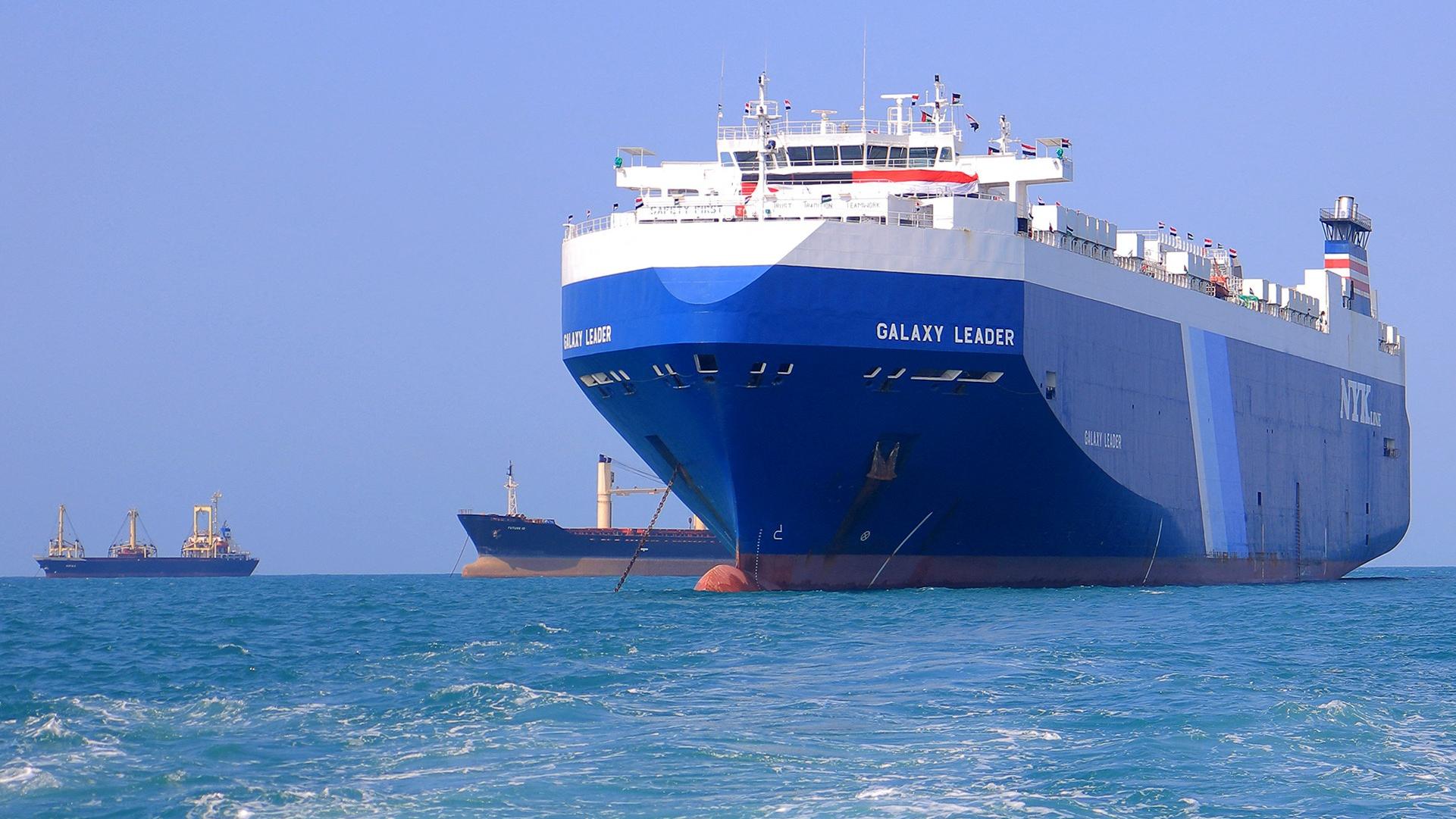 A picture taken during an organized tour by Yemen's Houthi rebels on Nov 22, 2023, shows the Galaxy Leader cargo ship (right), seized by Houthi fighters two days earlier, approaching the port in the Red Sea off Yemen's province of Hodeida. (PHOTO / AFP)
A picture taken during an organized tour by Yemen's Houthi rebels on Nov 22, 2023, shows the Galaxy Leader cargo ship (right), seized by Houthi fighters two days earlier, approaching the port in the Red Sea off Yemen's province of Hodeida. (PHOTO / AFP)
SANAA/ADEN, Yemen - Yemen's Houthi group on Thursday rejected a joint statement issued by 12 countries condemning Houthi attacks on commercial ships in the Red Sea, and vowed continued targetting of "Israel-linked commercial ships" in the waters.
The Houthi Spokesman Dhaifallah al-Shami said in a statement that it is "a moral failure and a miserable attempt to cover up the crimes of Israel," considering "America and Western countries are supporting Israel in committing more genocides against the Palestinian people."
ALSO READ: Yemen's Houthis claim new attack on cargo ship in Red Sea
He stressed that the armed group would continue attacking what it called "Israel-linked commercial ships" until Israel ends the conflict and siege on the Palestinian enclave of the Gaza Strip.
The Yemeni Presidential Leadership Council (PLC) on Thursday also warned the Houthi rebel group against continuing its attacks on ships in the Red Sea
On Wednesday, the governments of Australia, Bahrain, Belgium, Canada, Denmark, Germany, Italy, Japan, the Netherlands, New Zealand, Britain and the United States issued a joint statement, condemning Houthi attacks against commercial vessels transiting the Red Sea, and calling for the immediate end of the attacks and release of unlawfully detained vessels and crews.
"The Houthis will bear the responsibility of the consequences should they continue to threaten lives, the global economy, and the free flow of commerce in the region's critical waterways," the joint statement warned.
READ MORE: Yemen's Houthis say 10 fighters killed by US Navy in Red Sea
The Yemeni Presidential Leadership Council (PLC) on Thursday also warned the Houthi rebel group against continuing its attacks on ships in the Red Sea.
In a brief press statement revealed by the state-run Saba news agency, the PLC, chaired by Rashad Al-Alimi, held the Houthis fully responsible for any potential consequences stemming from their military operations against commercial ships.
In a PLC meeting held in the Saudi capital of Riyadh, the Yemeni leaders cautioned that such Houthi attacks could draw Yemen into an "international war" and exacerbate the human suffering caused by the years-long military conflict in the country.
It accused the Houthis of turning the territorial waters into an arena for international conflict and threatening a lifeline for Yemenis by disrupting shipping and driving up costs.
The United States along with other Western countries formed last week a multinational maritime coalition to secure the ships transiting the Red Sea from the Houthi attacks
With tension escalating in the Red Sea, the presidential council called on the international community to strengthen Yemen's government defenses and deter further Houthi violence.
READ MORE: Houthis claim fresh attacks on ship in Red Sea, Israeli city
Since the Israel-Hamas conflict broke out on Oct 7, 2023, the Houthi militia has escalated their attacks on Israel-linked ships, demanding that food and medicine aid be allowed to enter the Gaza Strip.
The Iran-backed Houthis control much of northern Yemen, including Sanaa and the strategic Red Sea port city of Hodeidah, where the group has held the Galaxy Leader, a Japanese-operated cargo ship linked to an Israeli company, and its crew, since they were seized on Nov 19, 2023.
The United States along with other Western countries formed last week a multinational maritime coalition to secure the ships transiting the Red Sea from the Houthi attacks.
ALSO READ: Yemen's Houthis again warn off US forces in Red Sea
The US naval forces responded to a distress call from a merchant boat in the Red Sea reporting being under a Houthi attack, sinking three Houthi boats, and killing its 10 fighters.
A significant number of companies are already rerouting their ships around South Africa to reduce their risks, which takes an additional 10 days to journey on average and negatively impacts international trade and costs of freight, Secretary-General of the International Maritime Organization (IMO) Arsenio Dominguez said earlier this week.


